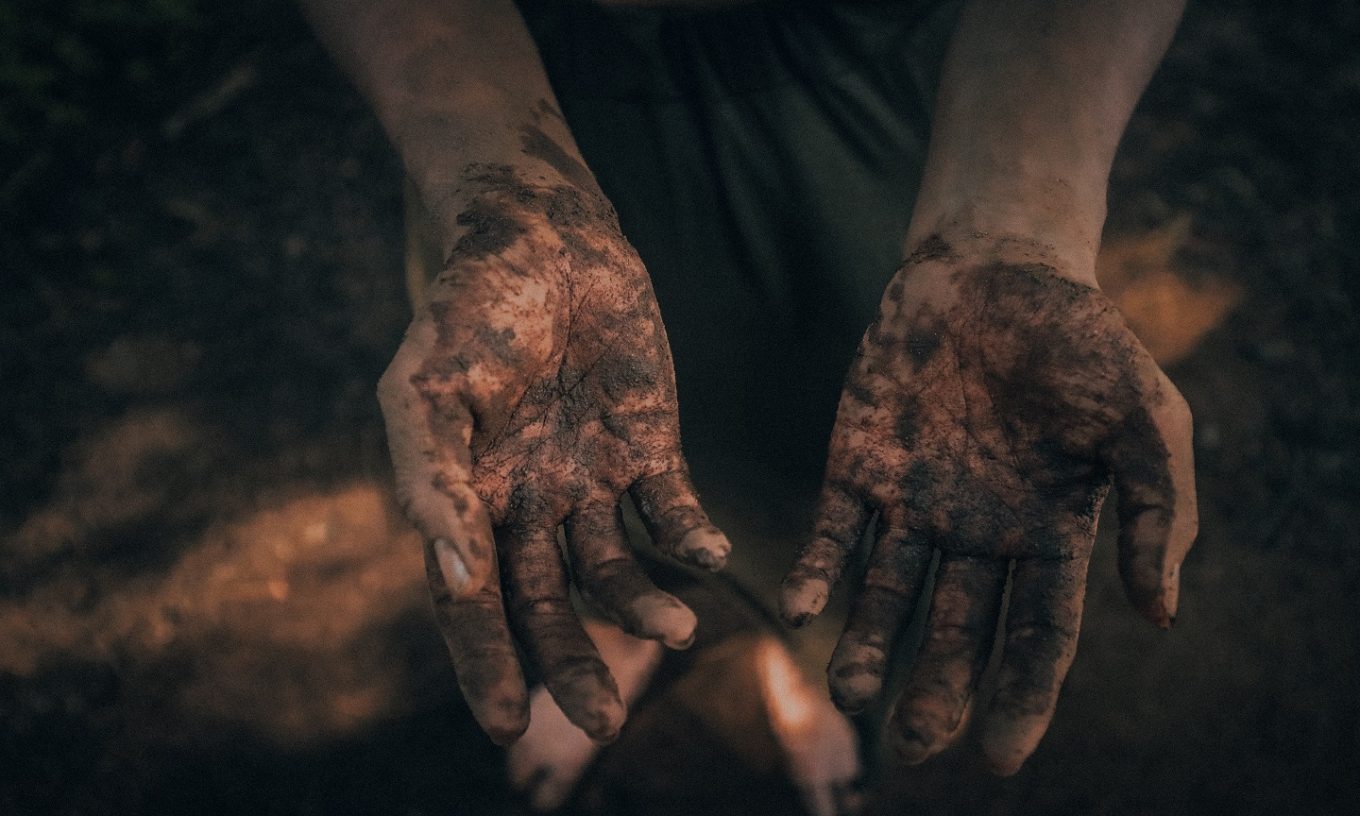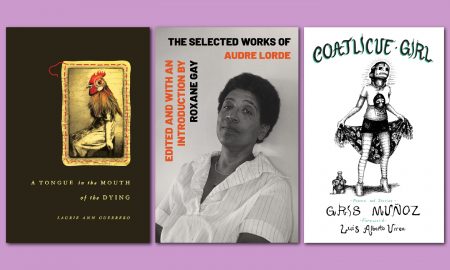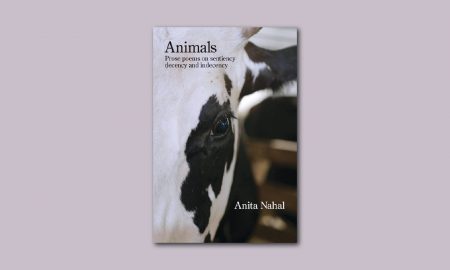Sunlight dappled the muddy path she walked down to the creek. Hoof prints, like miniature mud pools, dotted the path in regular intervals, the journey of the deer Carolyn Janis had seen nibbling her hostas as it tracked from the woods abutting her yard. She’d sprayed on Deet, but mosquitoes still buzzed too close to Carolyn’s ears and gnats swarmed her face. She reached the downed oak and climbed over its crumbling, decomposing trunk. There, in a shady depression she placed her True Value white and red plastic bucket down. From overlarge pockets on a gardening vest painted with purple and yellow flowers, Carolyn rummaged below seed packets and a trowel to grab her mud-stiff gardening gloves. She stretched the gloves over her fingers and took out her trowel.
Lake Erie lay two streets away from her home in Bay Village, a suburb west of Cleveland, Ohio. Basswood and red oaks stretched their boughs high above the ground and fallen branches from winter storms created crude, scribble-like sculptures across Carolyn’s view of the gleaming water. Nestled in a copse of fern and jack-in-the-pulpits a few feet from where she stood, lilies-of-the-valley dangled like forlorn children in the gloom. Carolyn stepped over stones and moss and crouched beside them. She placed her trowel in the soil and dug deep, inches away from the dark green shoots of the young plants. She lifted a shoot along with clumps of soil clinging to its spreading roots. Gently she placed it into the bucket as a chipmunk scurried within the undergrowth.
Remember, always take the plant out with its surrounding soil so it doesn’t go into shock.
She remembered standing near the creek in the woods behind her childhood home, water rippling and eddying around small rocks as she danced foot to foot on skinny legs in a desperate need to pee. She’d crossed her legs and started to jounce. Her father, Daniel Simmons, didn’t notice.
When you transplant, it is still surrounded by soil it knows. It gives a plant a better chance to survive in a new area. Just watch.
I can’t. I gotta pee!
Hold it, for Chrissake!
She wore a purple and yellow paisley sun suit given to her the day before on her 6th birthday. It was her favorite piece of clothing. She didn’t want to pee in it.
Now, as she crouched by the lilies of the valley, picturing Daniel’s rough hands taking care to prevent trauma to those wild plants, anger uprooted her peaceful mood. She recalled from her youth the jewel-like drops of sunlight along the forest floor and the twisted, dry vines that trailed from tall trees to linger along the creek’s edge. The memory made her stomach feel like she’d swallowed sour milk, even with fifty years between the then and now.
Jewelweed. See its petals? Put them in water and they glow silver. Jack in the Pulpit? You see, if you lift the covering, it looks like someone standing and giving a sermon. Joe pye weed? It loves streams and hillsides. Dry its leaves and make a tea. It cleans your urinary tract.
Daniel had tucked dirt around the fragile roots as if tending the coverlet for a baby. She’d fast turned away from her father and scrambled behind a clump of ferns to pee.
When she and Daniel returned home, he transplanted the wildflowers in a special garden near his rose bushes. They thrived in her dad’s well-tended soil. Nancy, Carolyn’s mother, especially loved the smell of lilies of the valley.
Carolyn winced at the memory of her father bringing home perfume that smelled like lilies-of-the-valley for her mom. Daniel had punched her mother’s face two days before buying the perfume. When her mom removed the small, turret looking glass stopper from the perfume bottle, Carolyn doubted she smelled the floral aroma with her swollen and bandaged nose.
Carolyn straightened her back and stood up. She looked once more at the light reflecting off Lake Erie. Blue jays bristled and crows cawed as they skittered among the branches. She grabbed the bucket’s handle. Humus infused the air, its scent earthy and nourishing. When she’d bought her present house, she’d taken wild flowers from these woods for her garden – bee balm, columbine, and joe pye. Now and then she made joe pye tea, or made Oswego tea out of bee balm leaves. Carolyn appreciated these living, growing, tender plants. She liked caring for them.
People need care, too. Too often this declaration sprouted up from somewhere deep inside her.
She returned to her house and set the bucket down. In a patch of earth, she positioned the plants to allow space for their roots to stretch and grow. Her stomach gurgled, and she realized she hadn’t eaten. She made a mental plan to shower and eat before visiting Daniel. Today she’d take him a scone, home-grown tomato, and jam she’d made with what the orioles and bluejays left after filling their gullets from her mulberry tree.
Her house was quiet, empty. Her husband had died the year before. Masie and Nora were gone – Masie married and Nora soon to be married, both working in other cities. She paused at a picture of her daughters together, positioned near an old photograph of the Simmons family. The Simmons family picture hung askew. She straightened the frame and noted the forced smiles on the faces of her siblings.
Earlier that morning she’d received a call from the skilled nursing unit Daniel resided in a few miles from her home. He lay in bed, refusing to eat, his breathing labored. “He’s deteriorating fast, losing his energy,” the woman said.
Well, aren’t we all, Carolyn mused as she considered her graying hair and sun-speckled skin. The nurse had spoken as if Daniel could hear from his room five suites down from the nurses’ station, over a speaker playing Bing Crosby songs from the 40’s. Akin to tendrils of poison and common ivy vying for purchase on her maple tree, a double helix of love and hate twisted through her emotions and muddled her feelings whenever she considered Daniel.
Each month Carolyn texted her two sisters and brother, informing them of their father’s health. Since admitting him to Golden Sunsets Care Facility eight months before, she had been his only visitor. Her brother lived in Columbus, two hours from Bay Village, and her sisters lived within easy half-hour drives. She didn’t fault their negligence, nor the anger they felt from his cruelty. Carolyn lived closest to him; by default, she was the go-to person for health care decisions and buying his old men diapers and protein drinks. Carolyn’s begrudging good graces did what her siblings would not.
Daniel reaped the fruit of not nurturing his own kids.
Carolyn wished she wasn’t so like him.
She drove toward the nursing home, her thoughts weaving back in time to when she was thirteen. Daniel and her mother had argued in the front seat during the early morning ride to Presque Isle on Lake Erie. Her two older sisters and younger brother, along with their mother, had rushed onto the sand and into the cool, glistening waters after a hot ride in the country station wagon, humidity and gas fumes giving Carolyn a headache and Daniel’s refusal to stop for a pee break causing her mother to wet her pants.
The lake cleansed Carolyn’s body and eased her anxiety as waves held her in the gentle back and forth of their rocking. Within an hour she was sunburnt and waterlogged. Daniel asked if anyone wanted to drive with him into farm country and orchards. Carolyn didn’t want to be with him, but she loved seeing farms with fruits hanging ripe, ready to be plucked and eaten. She said yes. Daniel drove through Harbor Creek and Northeast Pennsylvania, along county roads with chicken-wire fencing and fields bursting with Concord and Niagara grapes.
I can’t believe the rest of them waste their whole day swimming in the lake.
They stopped at a sun-bleached lean-to squatting back from the road like a tired old field hand, red and purple grapes and plums in shallow wood baskets, next to paper bags filled with peaches and tomatoes. Daniel beamed at the rich, round quality of the tomatoes, and the plump and soft flesh of the ripe peaches. He bought both and tied the paper bags with twine. He lectured her on the wealth of farming and history in this area around Erie. When they picked up her mother and siblings at the beach to head home, her mother wanted a peach. Daniel said no. He was saving them for later.
Daniel kept the bags tied in the family’s cool, dark basement. The peaches rotted after a week, their juices seeping through the bags and congealing on the concrete floor. When Carolyn’s mother angrily ripped open the bag of tomatoes, a lone tomato was unblemished and edible.
Set-off from a busy highway, the Golden Sunsets rested on three long acres of well-tended grass girdled by birch and linden trees. Flower boxes stood on tentative wooden legs at the entrance, their vibrant, overflowing colors a counterpoise to the flaccid and fading bedridden within. Carolyn signed in with the nurse. Decorating the corridor walls, calendars highlighted special movie nights and activities. Papier-mâché flowers bloomed within sprigs of paper grass, a photo of each resident in the center of a flower. Their smiling faces belied their forced incarceration, demeaning their lifelong journeys to pre-school silliness on a bulletin board.
Daniel’s room faced the morning sun, warming his already overheated room. A flurry of loud, bickering house finches hopped up, down the perches of the feeder outside his window, their complaints a quiet refrain to the in-out of his forced oxygen.
“Hey, it’s me. Carolyn. The nurse says you’re not eating today. What’s up?” The door closed quietly behind her. The heated air felt thick, viscous, hotter than outside.
Her father opened his eyes. “I’m not hungry. They keep trying to make me eat.” His rheumy eyes looked at his feet sticking out from the covers. His voice was just high enough to hear over the pull-in, pull-out swoosh of the oxygen machine connected to his nose.
“Well, I bought you a scone and jam. Plus, a fresh, ripe tomato from my garden, cut and ready to eat.” She lay the napkin wrapped food on his tray. He looked at the food but didn’t move.
“You made the jam?” One rough and hairy foot massaged the other as he stared at his toes.
“Yes. And the scone, too. It’s cranberry.” She seated herself in the recliner next to his bed.
“Haven’t seen you in a while.” A trio of chickadees swooped into the feeder, startling the finches off into the nearby bushes.
“I had to finish a sewing project.”
“You remember when I bought the sewing machine? Your mother wouldn’t touch it.” Drivel pooled in the corner of his pale lips. He breathed heavily. “You’re the only one who learned to use it – took any interest in it.”
“You knew Mother hated sewing. She told you but you insisted she learn anyway, to make draperies for the house. You could’ve learned to sew, you know, if you were so interested in starting a business.” She recalled the whir of the old Pfaff sewing machine and the feel of her first piece of store-bought fabric, her first pattern. See? feels good, doesn’t it? he’d said as she cut the pieces. Daniel berated her mother for being lazy and not learning how to operate the sewing machine. Carolyn wanted to hate the idea of sewing to support her mother, but she liked the notion of choosing a pattern and creating something to wear. Within three months she’d made herself a dress.
“Useless. All the others. Try to blame me for everything.” He shrugged and yawned.
Carolyn wriggled in her chair as wraith-like images fluttered up from her memories. In the feeder, a motley group of finches and sparrows flitted around the feed.
“Of all the times we visited Lake Erie, you were the only one who visited the orchards with me.” He paused, looking up at the ceiling. “All those berries. You remember the peaches we picked?”
Carolyn said nothing.
“I was thinking today, you’re the only one who gardens, at least from what I know of the others. Remember the tomatoes I grew? And the big, fat juicy ones we used to get in the country?” His unsteady, age-speckled hands curled into the size of his vaunted tomatoes.
In-out, swoosh-swoosh.
“I remember them. I especially remember the big, fat, juicy tomatoes and peaches you stuck on the basement floor and refused to let us eat so they rotted.” Carolyn watched him grimace. “I also remember you screaming because a week later, someone ate a tomato from your garden.”
“For Christ’s sake, is that all you can say?” He snarled.
In-out, in-out. The oxygen tank sounded louder to her.
“No. When you found out Mother used the tomato from your garden for our sandwiches, you flew into a rage and broke her nose.” Sweat seeped down her back. “Then you gave her lilies of the valley perfume to make amends.”
“Made-up story!” Her father’s quavering fingers grasped the edge of his blanket and cover.
“No, it’s not. The tomato I brought you today – it was the best in my garden. I want you to eat it.” The room’s hot air squeezed her body. She’d drop by the water fountain before she left.
Daniel lay quiet. Carolyn watched the birds flutter, grab their seed, leave their perch as others swooped in. Constant tension.
“Have you ever wondered why the others don’t visit you?” A flurry of dust particles scrambled in the air as she spit out her question. Bruised arms, reddened cheeks from her father’s fits of anger, wounded, scarred spirits – over the years she had mentioned to him some of his cruel behavior; he either denied the events or refused to admit fault.
“I know, I know. Everyone blames me. Even your mother before she died. Christ, doesn’t anyone else do anything wrong as far as you’re concerned?” His open mouth resembled a sagging black hole.
“Well, we don’t beat our kids or spouses for eating what is supposed to be eaten, or ruin holidays over a spilled drink.” Christmas Day. Spilled eggnog on the couch left her oldest sister with a turgid, purple bruise where he’d slammed her cheek with his hand.
In, out, swoosh-swoosh. Just like the conversations she’d endured before with him. There were no epiphanies, no wriggling, white shoots of awareness bursting into the light of day, where they might flourish and grow.
She roiled under her own likeness to him. When she was in high school, she’d read Macbeth, discovering later that Daniel studied Shakespeare in college and played Macbeth in community theater. He’d given her a wildflower book when she was ten, because she liked them, just like her father. She planted wildflowers, tomatoes and berries, which she loved and grew – just like him. It was she who got excited learning how to sew the lonely pieces of material into an identifiable whole, just like he’d hoped his wife would do.
But Carolyn had never hit a child or kicked a foot stool across her living room, threatening to drown a cat like Daniel had when the Simmons’ cat, Flopsy, missed the kitty litter box because of old age.
Her father shifted under the bedcovers and turned his head into the pillow. “I’m tired. Gonna take a nap.” He yawned. “Save the tomato for yourself, if it’s your best.”
“No. It’s for your enjoyment. You want me to stay here while you sleep?” The air felt like bricks on her chest, the ebb and flow of the oxygen machine like a grindstone.
“No.”
She bent close to him. Errant strands of white hair sprouted from his mostly bald, age spotted head. She kissed it, her insides recoiling. His eyes were closed. She moved his tray and checked his supply of diapers and drinks. She tiptoed toward the door.
“I’d like to think you got your love of wildflowers and gardening from me.”
In, out, swoosh-swoosh.
There, in the open. Carolyn turned to look at him. He’d turned on his side, away from her, feet pulled up under the covers. Twittering continued in the bird feeder, as a blue jay shoved a finch from its perch. A messy roux of anger, hatred and pity stewed within her, made gummy with her recognition that he had enriched her life, like it or not.
She quietly left the room.
Photo by Chris Yang on Unsplash





